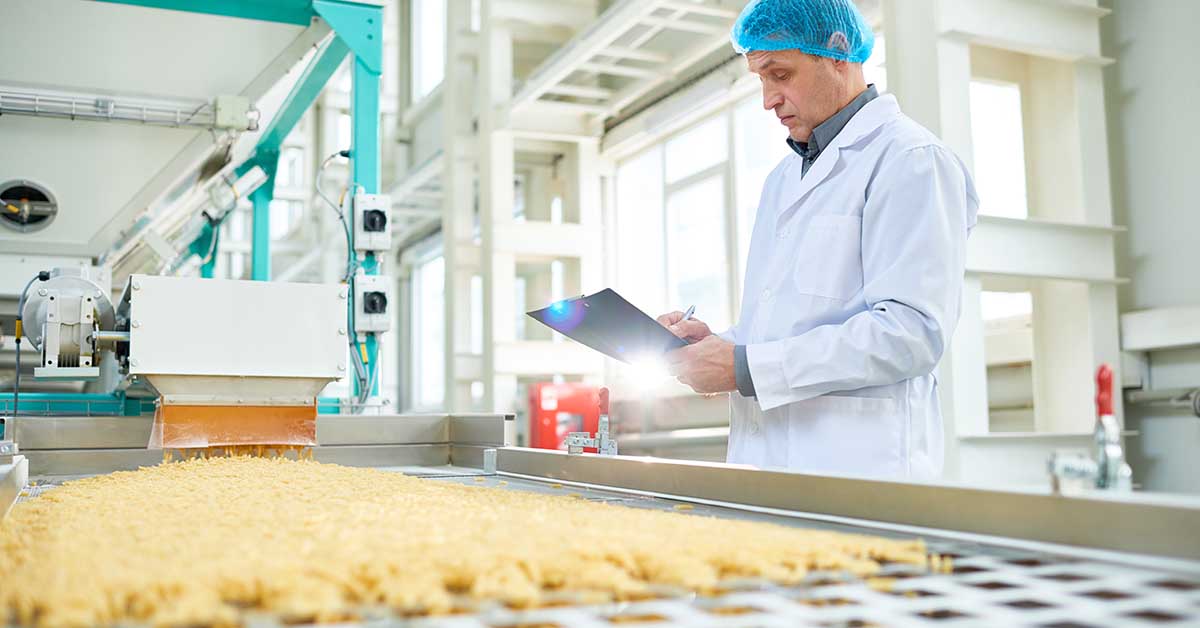
Insights from our Food Safety Risk Management seminar
13 November 2024 | Andrew Collins, Global Safety Lead
Managing risk effectively is crucial to remaining profitable and competitive and the way it is done is getting ever more sophisticated.
Many industries have transitioned away from a compliance led approach to risk to one of assurance, essentially a more comprehensive and holistic risk control system.
Recognising the need for this shift, our recent Food Safety Risk Management seminar focused on how the food and drink sector can leverage tools and strategies from other industries to create a more holistic and effective risk management system.
Here is an overview of some of the main highlights from the event.
Key topics and speakers
The day began with the event’s chairperson Steve Wearne of the Codex Alimentarius Commission, introducing delegates to the Codex Alimentarius international food standards and codes of practice that contribute to the safety, quality and fairness of the international food trade.
In his presentation Steve outlined some of the challenges that Codex talks about within the context of the food industry, before concluding that we will need to adopt new approaches to risk management if we’re to respond better to complexity and change. He also affirmed the need to learn from other disciplines, which set the stage perfectly for the rest of the day with a mix of speakers from within and outside the food industry offering ideas, to provide a more comprehensive perspective on risk management strategies.
Evaluating how we lead to foster a stronger safety culture
Following Steve’s presentation, Rachael Cowin from Legitimate Leadership took to the floor to discuss the power of transformational leadership in nurturing a stronger safety culture.
The crux of Rachael’s argument was that if we’re to nurture better safety outcomes then we need to change the way we manage our employees, from one that is hierarchical and micromanages, to one based on legitimate leadership that encourages empowerment. The belief here is that by increasing the key elements of trust, accountability and fairness among your employees the stronger culture that results will not only nurture better workplace dynamics but also enhance overall safety outcomes too.
Examining risk assessment in the food industry
Bringing the issue of risk back to the food industry, Maria Masoura from Campden BRI went on to share her expertise of food safety, risk assessment and how this can be applied to industry.
From initially exploring the pillars of food safety risk analysis, Maria talked in more detail about risk assessment in the food supply chain from farm to fork. While focusing on some of the potential key hazards that can occur, Maria offered practical frameworks for evaluating these hazards including their probability and risk of occurring, so better measures can be devised to reduce overall risks.
Managing incidents more effectively
No matter what industry we operate in, we can all learn from managing risk and incidents more effectively. Subsequently, the session from Hugh Mowat of WM Morrisons Supermarkets Ltd, on effective incident management strategies was helpful and informative.
From the Fishbone (Ishikawa) model to FMEA and more. Hugh took delegates through several different models, techniques and case study examples to help them learn how to better manage incidents should they experience them in the future.
Innovative risk management tools
Following a networking break, Alistair Cowin from Resilium UK introduced participants to the BowTie. This approach presents risk in a single, easy-to-understand diagram resembling a bowtie. The diagram clearly distinguishes between proactive and reactive risk management, offering a comprehensive view of various potential scenarios.
Alistair illustrated how viewing risk through this lens can yield fresh insights and enhance understanding, encouraging a more proactive approach to risk management.

The importance of communicating risk
Next delegates were taken through an insightful session from Andrew Collins of Campden BRI, on food safety risk communications.
While the food industry has always had its own specific way of dealing with hazards and communicating risk, Andrew highlighted how we could learn a lot from other industries and their approach to risk, to help further improve our own systems.
Subsequently, attendees were taken through a range of examples used in other industries including the Swiss Cheese Model of risk management, Snorre Sklet, OODA Loop and maturity modelling techniques. When it comes to safety, all these approaches can help improve the agility and resilience of organisation, irrespective of what industry they might operate in.
Bringing risk and insurance together
Following on from Andrew’s presentation, Paula Treacy and Matthew Couchman from Lockton, explored the intricate relationship between risk and insurance, and how both can be used together to improve business resilience.
Having talked through their approach to risk management and the Lockton risk management framework, the presenters detailed how organisations can reduce risk in their business through their handling of individual risks, activities associated with those risks and any practices they’re able to insure to mitigate those risks.
Looking to the future
To wrap up the day, John Carter from Ferrero Management Service SA, shared his insights for the future of food safety and quality, focusing on the impact of technological advancements in the industry. His forward-looking perspective encouraged participants to think critically about the challenges ahead and the innovations that could reshape their approach to food safety.
John’s primary focus was on how developments in AI will enable greater transparency throughout the supply chain from the farm to the consumer. Thanks to real-time insights throughout the supply chain, AI powered predictive analytics for earlier problem detection, and the ability to pinpoint inefficiencies and contamination risks before they escalate, future AI advancements will allow us to mitigate a higher number of risks.
Key takeaways
Throughout the seminar, attendees gained valuable awareness of effective tools and techniques that enhance the resilience and agility of their systems. Identifying potential hazards and understanding what could go wrong are crucial to ensuring the resilience of operations and the safety of products. By effectively communicating potential risks in advance, businesses can implement measures to mitigate them and assess the effectiveness of these strategies. This proactive approach not only safeguards operations but also builds confidence among stakeholders.
As we move forward in this ever-evolving industry, the insights shared at the seminar will be instrumental in helping businesses navigate the complexities of risk management in food safety.
The collaborative effort and shared knowledge from industry experts will empower organisations to enhance their risk management practices and safeguard their bottom lines and brand reputations.
How we can help you with regulatory compliance, food quality management and risk management
At this point it is helpful to remind you of the professional support we can provide in the areas of regulatory compliance, food quality management and risk management.
Through our experienced team of regulatory experts, we can help you to ensure your products are compliant with the legislative requirements of your target market.
We can also provide valuable, extensive and authoritative information and advisory services that help our clients stay compliant with food regulations in more than 80 countries. Our services range from global regulatory advice and food labelling compliance support to specialist training and UK and EU regulatory advice.
On the food quality management side, we can help you with the development and implementation of quality systems that enable you to meet the criteria requested by your customers and enforcement authorities.
We are well renowned for our HACCP services for food manufacturers and the agricultural industry, and we offer support in risk and crisis management and in optimising quality in the food laboratory, through our CLAS (Campden Laboratory Accreditation Scheme) service. We can also offer a wide range of technical support activities to help companies implement BRC Global Standard for Food Safety Issue 8.
We can also offer consultative expertise in the areas of risk assessment, risk management and risk communication. Through our expertise in food safety management and experience using BowTie risk assessment methodology, we can help businesses achieve a holistic end-to-end approach to risk management. Offering full risk visibility, our approach can help businesses develop a more robust safety culture that not only protects the workforce and operations but also their customers.

About Andrew Collins
Andrew joined Campden BRI at the beginning of 2009. With over 30-years’ experience in a wide range of food businesses (including catering), his current role focuses on consultancy work with the holistic and practical application of food safety management including the role of HACCP and good hygiene practices.
He is a certified BowTie practitioner, and is one of the few food safety experts globally using BowTie methodology – a barrier, risk-based thinking approach to risk management in the food businesses. This approach enables businesses to build holistic, resilient and adaptive systems in a rapidly changing environment.
Andrew also works on supply chain management, agriculture and water use, animal feed and traceability. Plus, he’s part of the team that manages hygiene and allergen management.
How can we help you?
Have you got a burning question on the topic of food safety risk that you need answering?
Looking to recap on some key regulatory issues?
Why not take a look at our most recent collection of articles relating to food regulations.







